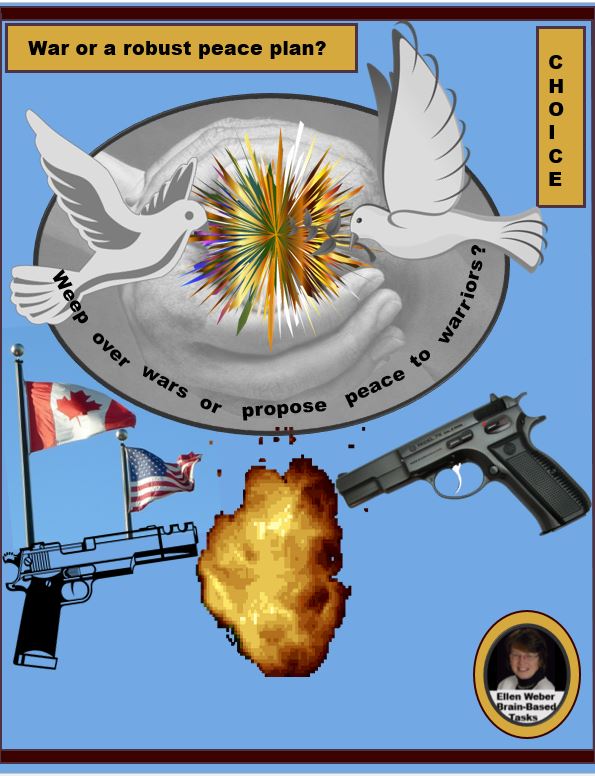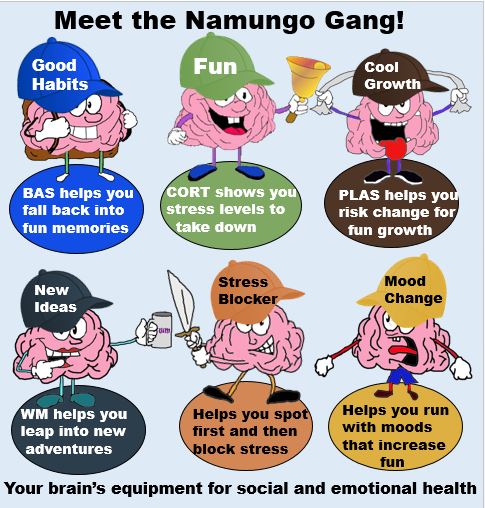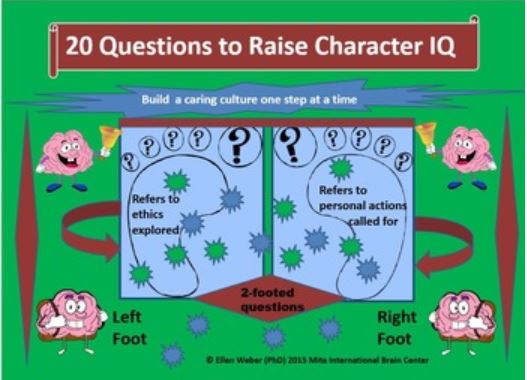Are you wired for anger, anxiety or payback when clashes strike on an ordinary day? Or do instant reactions for you tend to bring others together, find common ground or share assets? Remembrance Day is the perfect day to inventory our comebacks to personal assaults. A time to check our brain’s hardwired capabilities for leading peaceful solutions. How so?
Our knee-jerk reactions to strife shows evidence of stockpiled reactions, wired in from previous reactions to struggles and stockpiled into our mental storehouse. Few people realize that the chemistry of peaceful brains differs dramatically from that of brains bent on blame, anger, jealousy, rage or bullying.
Not one of us would walk into a bear cave in spring with a steak strapped to our foot. And most say they prefer peaceful possibilities to resolve pesky problems when they arise. So how have we wired entire nations for the misery of war and of endless conflicts?
Perhaps one starts the war with demeaning words, while another completes it with deadly actions. Strife starts with a choice before it erupts into battle.
Both war and peace strategies are learned behaviors and both grow with every repetition. As a citizen of two countries, I see the United states wires more for war along with history texts jam-packed with clever military maneuvers. In contrast, Canada prides itself more on active peace missions. In similar ways though leadership in both countries battle the other side with words that create chaos where there could be calm.
It’s a matter of choice at first, but eventually war or depends on habits typical of warriors or peacemakers. Hitler wired for war, Gandhi practiced peace. With every response to difficulties each leader wired their brains for more of the same in future struggles. 
Imagination and word choice at first …
How we value or detest war affects the way our brains wire to support or reject it. Replace words such as war on terror with peaceful expressions that grow strong, caring, diverse communities, and our brains shift from expectations of violence to proposals for peace. Yes, even across differences in underserved communities, those wired for peace build goodwill. Imagine a place of prosperity where no brain is left behind, and you’ve spawned a robust peace possibility.
Watch any contentious leader to see how peaceful interventions rarely follow rhetoric for battles though. War often marches in like a silent killer in brain based bits. We all suffer through a country’s growing addiction to fix-it-with-violence trends, just as we can all benefit from caring and peaceful solutions? War’s the opposite to holding out a mental olive branch, yet some insist peace is mere fantasy and myth, suggesting that without war bullies will benefit.
Some say peace offers a natural escape from our broken world. I say it not only rewires brains, but can blast open communication to rewire for togetherness where all benefit. What do you say?
Check out facts about war and peace as they germinate in brains:
1. Visuals matter: Images of violence or caring change your brain’s plasticity to engage in more. Have you noticed that violent responses are far more popular than highly intelligent peace plans to heal our nation? Recent research shows that repeated media violence diminishes the brain’s response for solutions.
2. Nations can change mentally: It’s possible to rewire our collective brains, as Ireland’s leaders discovered when they made a conscious decision to increase the country’s prosperity through peaceful means. It took a radical risk for leaders to promote peace in exchange for violence that Irish people had grown accustomed to. What would it take in our nation?
3. Enemy or amity zaps morale: Increasingly people claim to dislike their workplaces, and indication is everywhere that people see more toxic cortisol hormones being spread at work, than serotonin or the mental chemicals for well being. The National Institute of Mental Health reported well over 58 million people suffer from anxiety disorders. Have you noticed growing anxiety in your circles?
4. Brains are hardwired for challenge: The mind can adapt to peaceful plans past differences through actions that engage opposing views on controversial topics. People who learn the art and science of disagreement tend to ask, “What if…?” and engage tools such as brainstorming, listening, admitting mistakes, trying out other people’s ideas, and evaluating alternative solutions that remove guns from the equation. Act vulnerably or compassionately and serotonin becomes the brain’s fuel to find common ground together.
5. Flame wars create stress: Harmful chemicals such as cortisol surge with flame wars where people fail to step back and consider value from an opposing view. Good tone, on the other hand, enables people to communicate understanding and prosperity across differences. Consider the wide mix of intelligences that benefit groups who create a peaceful climate to challenge high-impact minds.
Since human brains rewire for war or peace depending on what we do daily – how might we reflect peace today that trumps battle plans of the past?
100 Peace Prompts that will stretch brain power, add refreshing new activities to celebrate Veterans Day and foster peace building strategies that work well.
20 Questions to amp up peaceful character, will help to build talented and peaceful leaders.
Debate both sides with brain based tools – to heat up both sides as you articulate strategies germane to both war and peace.






Pingback: 15 Million Jobs for Innovation Era – Brain Leaders and Learners
Pingback: Hardwired Nation for Violence and Abuse – Brain Leaders and Learners
Pingback: Democracy – Crown of Brainpower – Brain Leaders and Learners
Pingback: Urgent Call for Innovative Interactions – Brain Leaders and Learners
Pingback: Obama Leads Peace with the Brain in Mind – Brain Leaders and Learners
Pingback: Mindful Leader Series 2 - Rubenstein’s Humility – Brain Leaders and Learners
Pingback: Gentle Links to Human Brainpower – Brain Leaders and Learners
Pingback: A Brain’s Proclivity to Integrate – Brain Leaders and Learners
Pingback: Brains Offer Olive Branch to Enemies – Brain Leaders and Learners
Pingback: Animal Brains Stoke Peace. Yours? – Brain Leaders and Learners
Pingback: Engage Differences for Creative Change – Brain Leaders and Learners
Pingback: What I Learned from Goverment – Brain Leaders and Learners
Pingback: Pages tagged "poised"